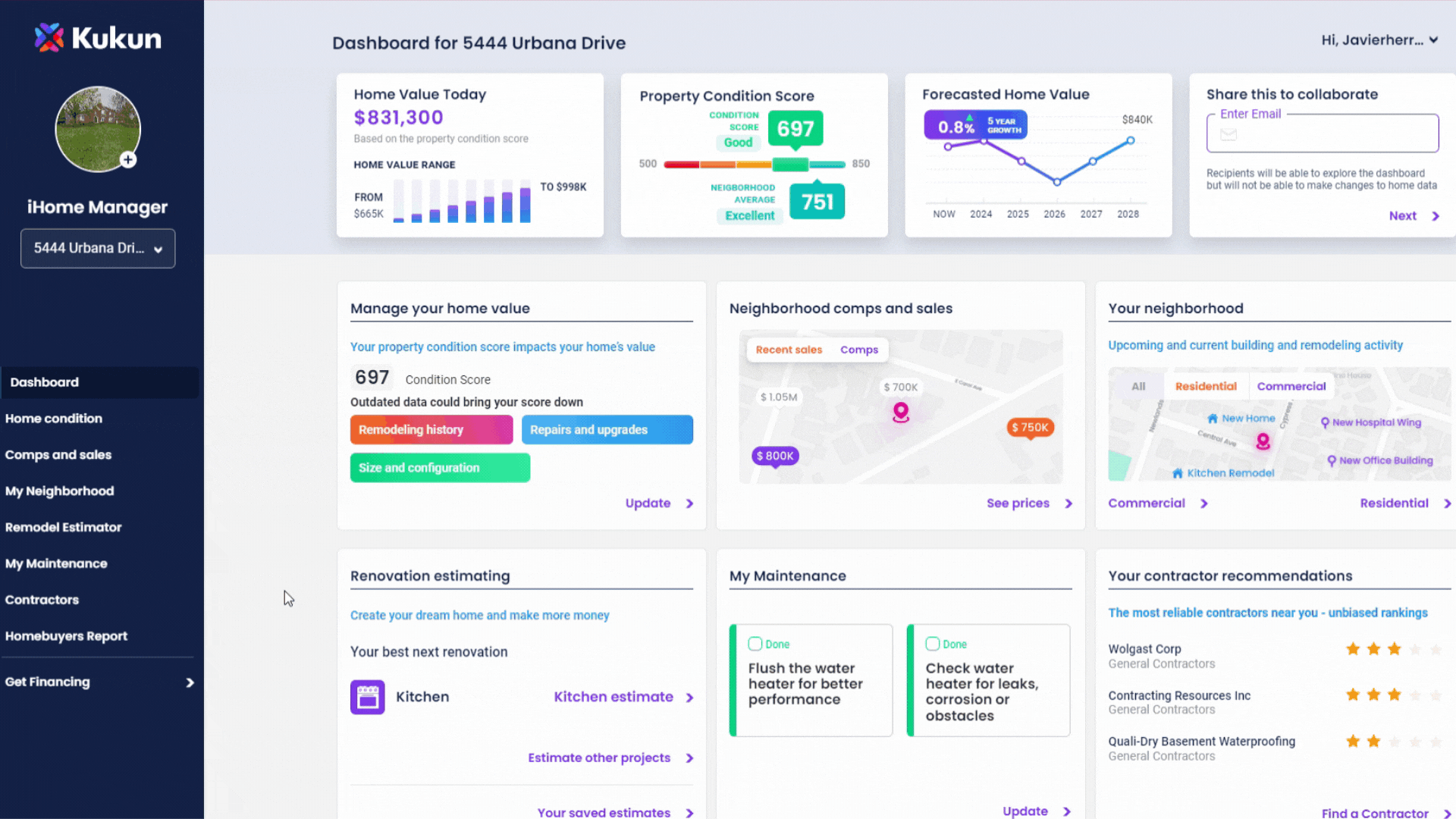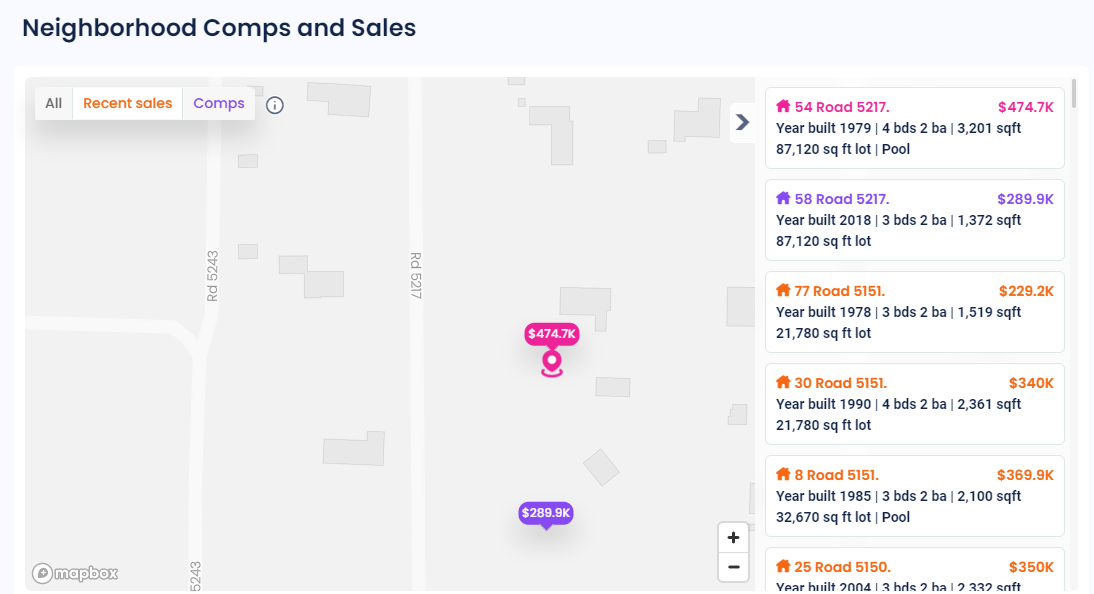Comparable home sales: A starting point for buyers & sellers
Updated Wed, Mar 12, 2025 - 8 min read
Top blog articles
Whether you’re a home buyer or a seller, finding comparable home sales in the area is a smart thing to do. It’s definitely easier now than it ever was. Finding publicly available data was a task then. You had to request your real estate agent or home appraiser to pull the data off of the multiple listing service (MLS).
Fortunately, today knowing how to find comparable home sales online is easy, quick, and more informative.
For instance, Kukun iHomeManager lets you browse a particular neighborhood and see the prices of homes around you. You can compare home prices and make an informed decision regarding buying or selling a home.
What are comps in real estate?
A real estate comp aka comparable home sale aka closed comparable sale is any recently sold house in your neighborhood that’s similar to yours – in location, home size, condition, and features. The sale cost is the ideal benchmark for price comparison.
If you’re beginning your research on finding comps in your locality, it’s essential to understand the valuable insights they offer.
How does comparable home sales help the buyer and seller?
These completed home sale transactions play a crucial role in assisting you in determining an accurate listing price for your property. Or, the house you’ve been eyeing. The neighborhood comps may even include similar homes in the area that are currently on the housing market. So basically, all similar homes – active, in-contract, and recently sold properties.
This pricing strategy not only attracts more potential buyers but also reduces the time the property spends on the market and facilitates a smooth transaction process.
These comps help you understand the current real estate market. What are the prevailing home costs, is it a buyer’s market or a seller’s, which home features are more in demand, what are the buyers’ preferences, and so on. You must focus on recently sold properties, preferably within the last three to six months, as they reflect the most current market conditions.
The bottom line is that these statistics help you arrive at a fair market value – whether you’re buying or selling a house.
Who uses comps apart from sellers and buyers?
Comps serve not only as a tool for home sellers and buyers but are also employed by real estate experts to analyze properties within your price range.
Banks also utilize comps, hiring third-party appraisal companies, to determine the fair market value when homeowners seek to finance their properties.
Let’s look at the table below for more clarity Role How They Use Comparable Home Sales Home Sellers They can, especially for sale by owner (FSBO) properties, utilize comps to determine the ideal listing price. And, ensure they are comfortable with the recommended listing price. Home Buyers Buyers decide how much to offer for a piece of real estate. This helps them avoid overpaying for the property they intend to buy. Home Appraisers An appraiser assesses a home and determines its worth. Appraisals are typically required by a buyer’s loan lender before closing. Sometimes sellers get an appraisal to set an accurate price. Realtors Real estate agents use MLS comps to create a comparative market analysis (CMA), track the local market, and assess overall trends.
Read more: Top strategies for homeowners to buy better
How can you identify real estate comps?
You should utilize multiple sources and verify the information to ensure you have the most accurate and up-to-date data available.
Your objective should be to identify at least three homes (more the better) that share similar characteristics based on the following criteria:
- Location and neighborhood: Focus your search within a quarter to a half-mile radius of your current home.
- Time frame: Consider only those homes that were sold within the past three to six months, or a shorter period if the market is rapidly changing.
- Size: Try to find homes that are approximately within 300 square feet of your own home’s size.
- Number of bedrooms and bathrooms: Include homes that have the same number of bedrooms and bathrooms as your home.
- Condition of the home: Take into account factors such as recent renovations, updated interiors, or outdated features.
- Age of home: Homes built around the same time as yours are the most suitable comparables as they generally have similar conditions for major systems such as roofs, HVAC, and plumbing.
- Nearby amenities: Look for homes that share similarities with yours in terms of walkability, proximity to shopping/retail areas, waterfront access, views, public transportation availability, and school ratings.
- Price per square foot: Real estate agents use price per square foot to identify comparable properties. Divide the sale price of a home by its square footage and compare that figure to your desired price per square foot.
What to do before and after finding comparable home sales?
Here’s how to go about utilizing the information in easy steps:
Understand your home’s specifications
- Create a comprehensive list to define your property. This would include location, size, land area, number of bedrooms and bathrooms, amenities, and any special finishes or upgrades.
- Consider additional factors that may influence the home’s value. These could be its school district, proximity to public transit or parks, etc.
Read more: Can go to school outside your district?
Search for recently sold homes with similar characteristics
- Utilize online resources and local MLS.
- Focus on “sold” homes rather than “listed” ones to get accurate sale prices.
Narrow down your options
- Identify three to six real estate comparables that closely resemble yours for a proper evaluation.
- In active housing markets, be more specific with your criteria to find close matches.
- In unique or rural areas, be flexible with your search parameters.
Gather additional information
- Whenever possible, visit the properties in person.
- Contact the sellers’ agents to gain insights that may not be apparent online.
- Look closely at online pictures.
- Read the listing descriptions carefully.
Adjust for differences
- Take into account variations in size, location, condition, and features among comparable properties.
- If a comp has additional features, adjust the price accordingly to account for the differences.
Be honest and practical
- Do not resort to shortcuts when determining the price of your home. Simply doubling the price based on its size compared to other properties is not a valid approach.
- Avoid the temptation of using poorly matched comparables and making guesses.
Calculate the fair market value
- Compare the sale prices of the selected comps to get an initial idea of the home’s value.
- Alternatively, calculate the price per square foot (PPSF) for each comp and use the average PPSF to estimate the value of your home based on its square footage.
What is the best way to find comparable home sales?

The best way to find comparable home sales is through a combination of methods and resources to ensure accuracy and relevance. Here are some reliable sources.
Online real estate databases
Utilize popular online real estate databases and websites such as Kukun Comparable Home Value to get information and proprietary home data on recently sold properties in your area.
Local Multiple Listing Service (MLS)
If you are working with a real estate agent, they can access the local MLS, which is a database, and share information about properties for sale and sold in the near past. The MLS typically contains the most up-to-date and accurate information about home sales in your area.
County property records
Visit your county’s property appraiser’s website or local government office to access public records of property sales. These records usually include essential details about recently sold properties, such as sale prices, dates, and property characteristics.
Real estate agents
Consult with experienced real estate agents who are familiar with your local market. They can provide valuable insights and access to a wealth of information about recent home sales, including off-market transactions that may not be publicly available.
Home appraiser
Consider hiring a professional home appraiser to obtain an impartial evaluation of your home’s value if you’re uncertain about setting the right listing price. Investing in this service typically ranges from $400 to $500. It can prove worthwhile for an accurate listing price, particularly in competitive markets or if you’ve undertaken numerous renovations and need guidance on their impact on the price.
Neighborhood observations
Take the time to explore your neighborhood to look for recently sold homes that are comparable to yours. This hands-on approach allows you to see the properties firsthand and assess their similarities to your home.
Read more: Real estate seasonality
Key takeaway
A real estate comp is a home akin to the one you are interested in buying or selling. It serves as a valuable tool in determining the price or value of the property. These real estate comps include properties that have been recently sold or are currently listed for sale in a specific area.
Licensed real estate agents, with access to the MLS system, identify properties within the same neighborhood that can be used for making comparisons. These are listings that closely match in terms of size, condition, features, and age. Ideally, these properties should have been sold within the past six months and be within a one-mile radius. In rural areas where properties are more spread out, a five-mile radius is considered acceptable.









